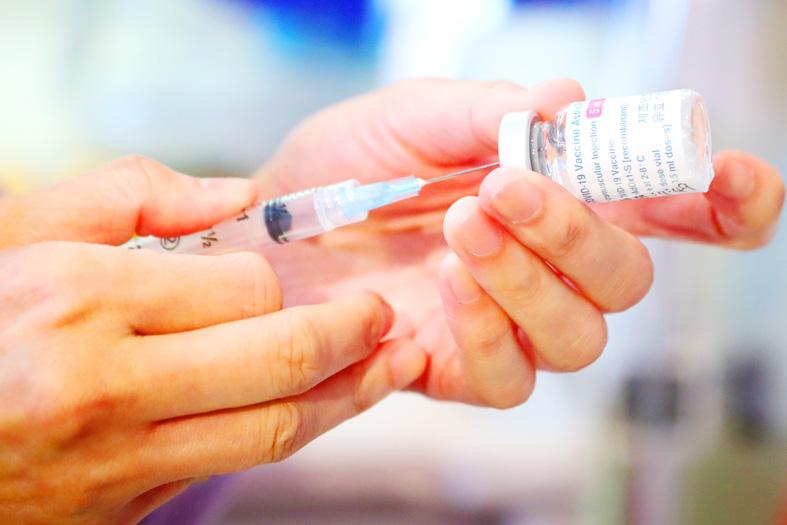Two insurance companies are considering offering new policies designed for people who need treatment due to serious side effects of COVID-19 vaccines, the Financial Supervisory Commission said.
The insurers plan to offer the products to individuals, but they have not finalized the scope of coverage nor the size of premiums, Insurance Bureau Director-General Shih Chiung-hwa (施瓊華) told a meeting of the legislature’s Finance Committee in Taipei yesterday.
“Once they [the insurers] submit their applications to launch the new products, we will expedite the review process so that the products can be put on the market and become available for consumers faster, if they qualify,” Shih said.

Photo: CNA
She did not identify the insurance companies.
Shih’s remarks came after Chinese Nationalist Party (KMT) Legislator Lai Shyh-bao (賴士葆) asked the commission if there are existing insurance policies to help people deal with any adverse reactions to COVID-19 vaccines.
“According to my understanding, no insurance policies would cover the risks,” Lai said, adding that the commission should address the issue, as controversies might arise after more people receive COVID-19 jabs.
The issue would be important, as some countries have delayed the rollout of the AstraZeneca COVID-19 vaccine over reports of blood clots, he added.
Lai asked the commission if it was encouraging the public to receive vaccinations, as the planned insurance policies would protect them.
“We think the vaccines recommended by the Ministry of Health and Welfare should not be problematic, but if consumers want the [insurance] products, we would make them available,” commission Chairman Thomas Huang (黃天牧) said.

KEEPING UP: The acquisition of a cleanroom in Taiwan would enable Micron to increase production in a market where demand continues to outpace supply, a Micron official said Micron Technology Inc has signed a letter of intent to buy a fabrication site in Taiwan from Powerchip Semiconductor Manufacturing Corp (力積電) for US$1.8 billion to expand its production of memory chips. Micron would take control of the P5 site in Miaoli County’s Tongluo Township (銅鑼) and plans to ramp up DRAM production in phases after the transaction closes in the second quarter, the company said in a statement on Saturday. The acquisition includes an existing 12 inch fab cleanroom of 27,871m2 and would further position Micron to address growing global demand for memory solutions, the company said. Micron expects the transaction to

Vincent Wei led fellow Singaporean farmers around an empty Malaysian plot, laying out plans for a greenhouse and rows of leafy vegetables. What he pitched was not just space for crops, but a lifeline for growers struggling to make ends meet in a city-state with high prices and little vacant land. The future agriculture hub is part of a joint special economic zone launched last year by the two neighbors, expected to cost US$123 million and produce 10,000 tonnes of fresh produce annually. It is attracting Singaporean farmers with promises of cheaper land, labor and energy just over the border.

US actor Matthew McConaughey has filed recordings of his image and voice with US patent authorities to protect them from unauthorized usage by artificial intelligence (AI) platforms, a representative said earlier this week. Several video clips and audio recordings were registered by the commercial arm of the Just Keep Livin’ Foundation, a non-profit created by the Oscar-winning actor and his wife, Camila, according to the US Patent and Trademark Office database. Many artists are increasingly concerned about the uncontrolled use of their image via generative AI since the rollout of ChatGPT and other AI-powered tools. Several US states have adopted

A proposed billionaires’ tax in California has ignited a political uproar in Silicon Valley, with tech titans threatening to leave the state while California Governor Gavin Newsom of the Democratic Party maneuvers to defeat a levy that he fears would lead to an exodus of wealth. A technology mecca, California has more billionaires than any other US state — a few hundred, by some estimates. About half its personal income tax revenue, a financial backbone in the nearly US$350 billion budget, comes from the top 1 percent of earners. A large healthcare union is attempting to place a proposal before